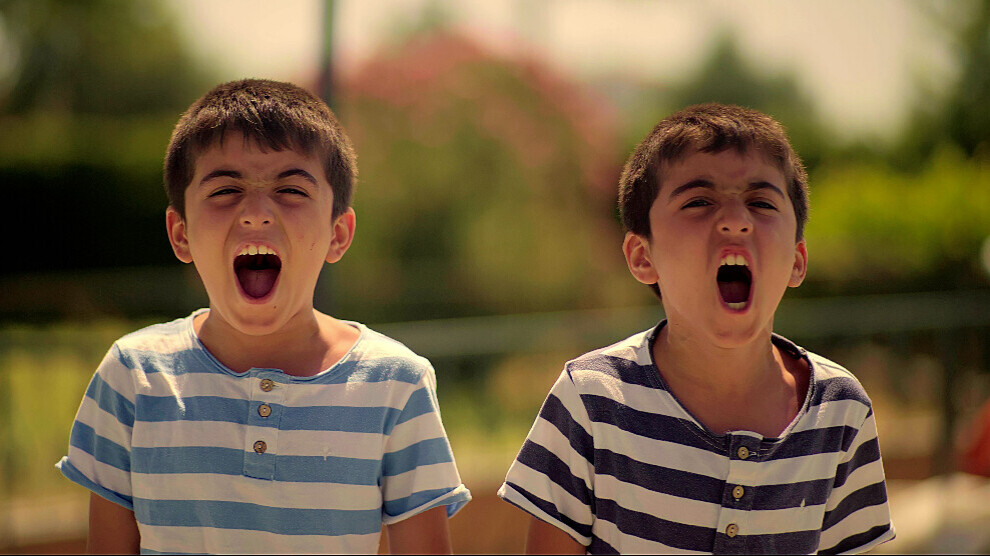The movie Time of Impatience directed by Aydın Orak, which tells the story of two poor twin brothers who want to dive into a proper swimming pool in a luxury site, talks about the class distinction from the eyes of children.
Two brothers, Mirhat and Mirza, who live in a poor neighbourhood of Amed (Diyarbakir), enter into a fierce rivalry with a security guard to swim in the pool in a luxury gated community. The security guard lives in the same poor neighbourhood, but he never allows the brothers to swim in the pool. The dreams of the two brothers hit the walls of not only the luxury site but also the social classes.
Director Aydın Orak, who spoke to Roni Aram about class difference through the simple dream of two little children, said about his movie: “The Little Prince said somewhere in the book, ‘It is always necessary to explain everything to the grown-ups.’ In fact, the grown-ups should understand and learn things from children.”

In your movie Time of Impatience, you call attention to poverty and class discrimination through the eyes of two children who live in a poor neighbourhood in Amed who want to swim in a gated community. What do you think about whether the children in the movie are able to make this distinction?
Much of the story is, for me, autobiographical. It comes from my childhood in Nusaybin. I think children do not have class consciousness because they are born in poverty, because they encounter the upper classes later in life. But I think the level of consciousness of children living in Kurdish cities is different. Because of harsher conditions, both economically and politically, they can be more woke.
For example, in the movie, two children are constantly learning the meaning of words from their father. In real life, I have seen children in Kurdish cities using those words. In fact, the “conscious, intellectual” state of those children in the movie was something I learned from many children living in that region. For example, there is a scene in the movie where the children ask the pool keeper, “Are you an idealist or a materialist?” I encountered children who asked similar questions in real life.
But they are aware that there is a conflict…
Yes. That’s why I wanted to talk about that class conflict with a very simple request made by the children, namely, to swim in a real pool. They may not be class conscious, but they are aware of this: there are the poor and the rich. But of course, they are not conscious of a class conflict as we understand it.
So where does the name of the movie come from?
They often ask why the title of the movie is not “pool”. Because the pool is just a metaphor, a symbol. We describe a class conflict through the pool.
Time of Impatience is the name of a book by Soviet writer Yuri Trifonov. I picked this name because I believe that something has to be impatient to riot. Children gradually become obsessive about swimming in that pool. I call them “Time of Impatience” kids, because I thought they had to be impatient from the very beginning.
Coming of age stories are a popular subject in the cinema, but you illustrate the childhood phase, not the adolescence phase. Mirza and Mirhat are still children, and they are discovering things. You mentioned the impact of the environment. How important is the environment in this discovery or learning process?
Children or adults living in that part of the country often hear these words that those living in the Black Sea region do not always hear in their daily lives: human rights, democracy, etc. They hear these words in daily conversations, on TV and in daily life. Because the Kurdish cities are politicized places. There has been an armed conflict there for years. Naturally, this shapes the minds of adults and children.
Of course, both the father and the idealistic teacher have an impact on the learning process of children in the movie. But only one of the twin brothers has a desire for learning. The other one has a different world. I think that environmental factors have a serious impact on children. For example, there is a conflict apart from poverty in the movie. The film does not directly deal with the Kurdish issue but gives a brief glimpse at it. Of course, it is a story that takes place in Diyarbakır. The children inevitably see armoured police vehicles when they walk down the city.
In the movie, the school principal keeps saying “The conditions here are different” or “Let’s sing something everyone knows” when the children sing in Kurdish during empty classes. Does he mean the Turkish national anthem?
Yes, that’s right. In our primary and secondary school, more than half of our classes were idle, and a principal or teacher would always talk about something just to fill in time. This is the education system in the region. Although Kurdish is freely spoken in public life, education in one’s mother tongue is still a taboo. They don’t say it’s forbidden, as the principal says in the movie, but they just ignore the Kurdish language.
The children write everywhere, “Why do the rich swim in real pools and we in fake pools? In the movie, pool problems are constantly heard in mathematics lessons. So, which pool problem is more solvable?
It can be solved more easily in mathematics. Because this is not something that can be solved very easily in real life, I guess. Class differences have been going on like this for a thousand years, not only in Turkey or in Diyarbakir, but also all over the world. It seems to me that it will continue for another thousand years…
It seems to me that we adults can learn a lesson from children who have a classless life, a borderless world and a limitless attitude. The Little Prince said somewhere in the book, ‘It is always necessary to explain everything to the grown-ups.’ In fact, the grown-ups should understand and learn some things from children. When children are born, they do not know the boundaries and class conflicts. It is the adults who draw boundaries and build walls. I made this movie with the hope of learning from children…





